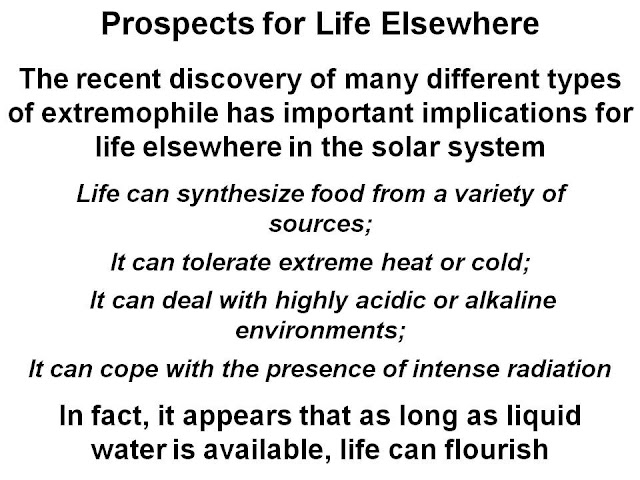In my talk in February 2010, I had looked at the question of search for extraterrestrial life. It is a complex subject and the following slides of my talk will address the question in a detailed manner. Post scripts will bring up the more recent developments. These have increased the sensitivity of detection but the final conclusions remain the same - there is no evidence of life outside of the Earth thus far.
Most life on Earth is carbon based and derives energy from the Sun. The main constituents of life on Earth are elements which are also the most abundant elements in the Universe.
The life, as we know it, survives in an environment whose parameters can only vary within a very restricted range. Water is considered essential. Ambient temperature, availability of nutrients and many other factors have
to be correct for life. In the solar system, there is a region containing Earth, where life is considered possible - so called habitable zone. Search for extraterrestrial life is to some extent a search for habitable zones in other star systems.
Life form interacts with the surrounding atmosphere and environment to harness and use energy for survival. This modifies the constitution of the atmosphere - for example, on the Earth, the atmosphere contains a complicated mixture of gases not found in the case of Mars and Venus.
It is believed that an indication of the presence of life might be inferred from a study of the atmosphere of extraterrestrial planets and lot of effort is invested in this pursuit.
While, we have not found any evidence of life elsewhere, nobody else has tried to contact us either (at least that is what we think). We are talking of intelligent, highly technologically developed life here. Obviously, primitive life, microbial or less technologically advanced, will not communicate efficiently.
Much progress has been made since 2010 in the exploration of Mars and in the search for exoplanets. It is now possible to detect water on some exoplanets and study the atmosphere in favourable cases.
There is also opinion about sending messages in space declaring our existence. This has met with lot of criticism in the sense that an aggressive civilisation, if it exits and is technologically much more advanced than we are, might wish to control us.
Search for extraterrestrial life is a fascinating subject and I am sure you will be following the future developments with interest. Thanks for reading.














































No comments:
Post a Comment